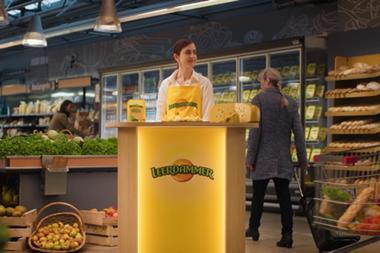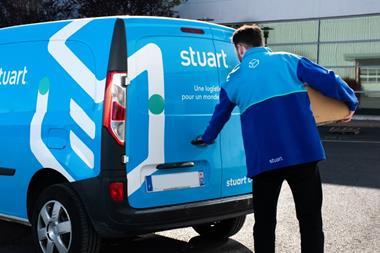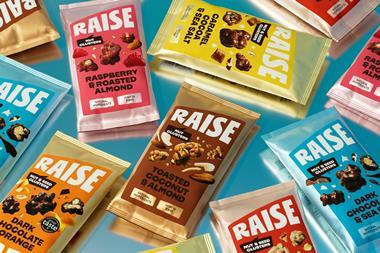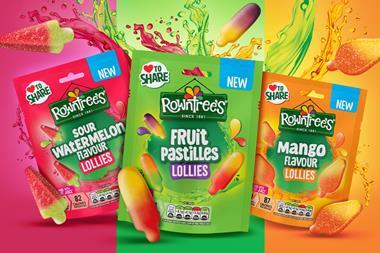If you had a Through the Keyhole-type nose around most kitchens you'd find the same few essential items over again. Bread, milk, spreads, cereals and eggs would be there, as well as table sauces such as ketchup. These are the core lines that most households take for granted and running out of them is bad news. But this is where the c-store comes into its own as the home of top-up shopping.
IGD senior analyst Stewart Samuel says: "C-stores have become much more viable for top-up shopping needs in recent years. Whereas many retailers once relied on core, traditional convenience categories to drive business - such as tobacco, confectionery and newspapers - the proportion of sales accounted for by these products has fallen from 36% in 2004 to 32% in 2007."
And staying in stock of key basket lines all day long is paramount, as CTP found that most top-up shoppers visit c-stores between 5pm and 7pm - mostly on their way home from work.
Bread is obviously a key top-up line. Warburtons category director Sarah Miskell explains: "With research showing that bread shoppers each spend £1,300 a year in c-stores, retailers need to ensure their bakery fixtures remain fully stocked throughout the day, not just in the morning."
The best-selling branded loaf in the UK is Warburtons 800g white Toastie, worth £123.6m, followed by Warburtons 800g white medium, worth £113.4m. The company also leads the field in branded rolls.
Warburtons recently unveiled its Convenience Perfect Bakery, a computer-generated bakery designed to offer advice on merchandising and promotions, created after in-depth consumer research.
Dairy de rigueur
Availability of milk is also vital to a convenience store. A Wiseman Dairies spokesman explains: "It is believed that if a convenience store has no stock of a key line such as milk for three visits, the customer won't return to that store. And many people are under the impression that milk needs only be fully replenished first thing in the morning. However, it's been proven that the busiest time for milk purchases in a c-store is after 3pm."
It's no great surprise then that Wiseman is in favour of Milk Guarantee schemes. Says the spokesman: "We think these are a really good idea as they raise the profile of milk in the eyes of staff as well as customers and thus raise its importance within the store."
Dairy Crest convenience customer marketing manager Will Pritchard points out that butters and spreads are an important top-up purchase. He advises retailers to understand their sales peaks and replenish their range regularly. He adds: "Always rotate date codes and pull old stock forward. And don't mark out-of-date stock down as it gives the wrong impression."
Unilever category director Phil Ellis adds: "Most households will have spreads in their fridge, but in the convenience channel there are a high proportion of 'need it now' purchases, where consumers have run out and need to stock up. These occasions are key to this channel."
Unilever runs the Partners for Growth merchandising initiative to help retailers stock what consumers want. Ellis explains: "Stocking the right products and presenting them in a logical way is vital to capture 'need it now' shopper."
Partners for Growth advises retailers to stock a tight range of the most popular butter and margarine brands in 250g and 500g pack sizes.
It also recommends that retailers experiment with higher value products, such as cholesterol-lowering spreads and spreadable butters. Says Ellis: "It is also important that retailers use their local knowledge of their customers, as research shows that specific lines and own label products can perform better in certain regions."
A question of quality
Product quality is always high on the consumer agenda and this is certainly the case in the egg market where, according to TNS data, 96% of households buy eggs, typically once every two weeks. Kevin Coles, spokesman for the British Egg Information Service, urges retailers to stock eggs that carry the Lion mark, saying consumers are reassured by this.
In other sectors, consumers look to brands to symbolise quality. According to Kellogg's marketing director and snacks general manager Kevin Brennan, cereal shoppers are very brand loyal. He says: "We enjoy some excellent repeat purchase rates, particularly with cereals in the taste category such as Crunchy Nut."
He adds: "Consumers are looking for a breakfast food that offers both great taste and a health benefit. For example, Kellogg's Special K range has seen an 11.1% rise in sales to a value of £121.3m."
Sauces are another area dominated by brands. According to IRI data, the average home keeps 10-15 bottles of sauce in their fridge/cupboard. In convenience, the sauces category is worth just over £45m. Heinz ketchup accounts for 91% of ketchup sales, and the company also leads the way in the £4.4m brown sauce market with HP.
In mayonnaise, Unilever's Hellmann's is the key brand. Amanda Pochetty, range and merchandising executive at Unilever, maintains retailers need to have the top-sellers available all the time. "Sauces shoppers are very brand loyal and tend not to browse," she says. "If the shopper can't see it or it isn't available, they'll shop elsewhere."
IGD senior analyst Stewart Samuel says: "C-stores have become much more viable for top-up shopping needs in recent years. Whereas many retailers once relied on core, traditional convenience categories to drive business - such as tobacco, confectionery and newspapers - the proportion of sales accounted for by these products has fallen from 36% in 2004 to 32% in 2007."
Retailers' views
Ajay Chapanery
Spar, Lower Penwortham, Preston, Lancashire
"Items such as bread and milk are daily essentials and core to our range. We've noticed that as the credit crunch starts to hit people, they are moving back to core lines; we are definitely selling more bread and milk. We have adapted our offer to take advantage of this and make sure we're not more expensive than our competitors - that's very important.
"Bread and milk come from Spar wholesaler James Hall and Warburtons and Kingsmill. We run at a 99% service level so always make sure we're in stock. People say not to carry extra stock but we do because we don't want to miss out on a sales opportunity.
"We used to display our eggs next to bread and cakes but we've now put them in the chiller next to cheese, butter and spreads so all the essential products are together."
Darren Steel
Operations manager, Budgens, Newent, Gloucester
"Eggs are big sellers and that's because we support local suppliers. When we switched to stocking two local farms' eggs, sales increased.
"With bread we sell Warburtons and British Bakeries plus have two local suppliers. But our biggest-selling single line is semi-skimmed milk in the size that's equivalent to four pints. We very rarely promote milk. It's an essential line and people just pick it up and don't look at the price. We rarely promote eggs either, but we always have a bread offer.
"We aim to have milk and bread in stock at all times. We might not have our full range of bread available later in the day, but we do have some lines. However, bread and milk are categories that are difficult to control, especially on the speciality lines like goat's milk."
According to HIM Convenience Tracking Programme data, top-up shopping is the biggest 'mission' for c-store shoppers, accounting for 40% of visits. On average the top-up shopper spends £6.45 per visit and visits just over four times a week, which equates to a weekly spend of £26.45.Ajay Chapanery
Spar, Lower Penwortham, Preston, Lancashire
"Items such as bread and milk are daily essentials and core to our range. We've noticed that as the credit crunch starts to hit people, they are moving back to core lines; we are definitely selling more bread and milk. We have adapted our offer to take advantage of this and make sure we're not more expensive than our competitors - that's very important.
"Bread and milk come from Spar wholesaler James Hall and Warburtons and Kingsmill. We run at a 99% service level so always make sure we're in stock. People say not to carry extra stock but we do because we don't want to miss out on a sales opportunity.
"We used to display our eggs next to bread and cakes but we've now put them in the chiller next to cheese, butter and spreads so all the essential products are together."
Darren Steel
Operations manager, Budgens, Newent, Gloucester
"Eggs are big sellers and that's because we support local suppliers. When we switched to stocking two local farms' eggs, sales increased.
"With bread we sell Warburtons and British Bakeries plus have two local suppliers. But our biggest-selling single line is semi-skimmed milk in the size that's equivalent to four pints. We very rarely promote milk. It's an essential line and people just pick it up and don't look at the price. We rarely promote eggs either, but we always have a bread offer.
"We aim to have milk and bread in stock at all times. We might not have our full range of bread available later in the day, but we do have some lines. However, bread and milk are categories that are difficult to control, especially on the speciality lines like goat's milk."
And staying in stock of key basket lines all day long is paramount, as CTP found that most top-up shoppers visit c-stores between 5pm and 7pm - mostly on their way home from work.
Bread is obviously a key top-up line. Warburtons category director Sarah Miskell explains: "With research showing that bread shoppers each spend £1,300 a year in c-stores, retailers need to ensure their bakery fixtures remain fully stocked throughout the day, not just in the morning."
The best-selling branded loaf in the UK is Warburtons 800g white Toastie, worth £123.6m, followed by Warburtons 800g white medium, worth £113.4m. The company also leads the field in branded rolls.
Warburtons recently unveiled its Convenience Perfect Bakery, a computer-generated bakery designed to offer advice on merchandising and promotions, created after in-depth consumer research.
Dairy de rigueur
Availability of milk is also vital to a convenience store. A Wiseman Dairies spokesman explains: "It is believed that if a convenience store has no stock of a key line such as milk for three visits, the customer won't return to that store. And many people are under the impression that milk needs only be fully replenished first thing in the morning. However, it's been proven that the busiest time for milk purchases in a c-store is after 3pm."
It's no great surprise then that Wiseman is in favour of Milk Guarantee schemes. Says the spokesman: "We think these are a really good idea as they raise the profile of milk in the eyes of staff as well as customers and thus raise its importance within the store."
Dairy Crest convenience customer marketing manager Will Pritchard points out that butters and spreads are an important top-up purchase. He advises retailers to understand their sales peaks and replenish their range regularly. He adds: "Always rotate date codes and pull old stock forward. And don't mark out-of-date stock down as it gives the wrong impression."
Unilever category director Phil Ellis adds: "Most households will have spreads in their fridge, but in the convenience channel there are a high proportion of 'need it now' purchases, where consumers have run out and need to stock up. These occasions are key to this channel."
Unilever runs the Partners for Growth merchandising initiative to help retailers stock what consumers want. Ellis explains: "Stocking the right products and presenting them in a logical way is vital to capture 'need it now' shopper."
Partners for Growth advises retailers to stock a tight range of the most popular butter and margarine brands in 250g and 500g pack sizes.
It also recommends that retailers experiment with higher value products, such as cholesterol-lowering spreads and spreadable butters. Says Ellis: "It is also important that retailers use their local knowledge of their customers, as research shows that specific lines and own label products can perform better in certain regions."
A question of quality
Product quality is always high on the consumer agenda and this is certainly the case in the egg market where, according to TNS data, 96% of households buy eggs, typically once every two weeks. Kevin Coles, spokesman for the British Egg Information Service, urges retailers to stock eggs that carry the Lion mark, saying consumers are reassured by this.
In other sectors, consumers look to brands to symbolise quality. According to Kellogg's marketing director and snacks general manager Kevin Brennan, cereal shoppers are very brand loyal. He says: "We enjoy some excellent repeat purchase rates, particularly with cereals in the taste category such as Crunchy Nut."
He adds: "Consumers are looking for a breakfast food that offers both great taste and a health benefit. For example, Kellogg's Special K range has seen an 11.1% rise in sales to a value of £121.3m."
Sauces are another area dominated by brands. According to IRI data, the average home keeps 10-15 bottles of sauce in their fridge/cupboard. In convenience, the sauces category is worth just over £45m. Heinz ketchup accounts for 91% of ketchup sales, and the company also leads the way in the £4.4m brown sauce market with HP.
In mayonnaise, Unilever's Hellmann's is the key brand. Amanda Pochetty, range and merchandising executive at Unilever, maintains retailers need to have the top-sellers available all the time. "Sauces shoppers are very brand loyal and tend not to browse," she says. "If the shopper can't see it or it isn't available, they'll shop elsewhere."
































No comments yet